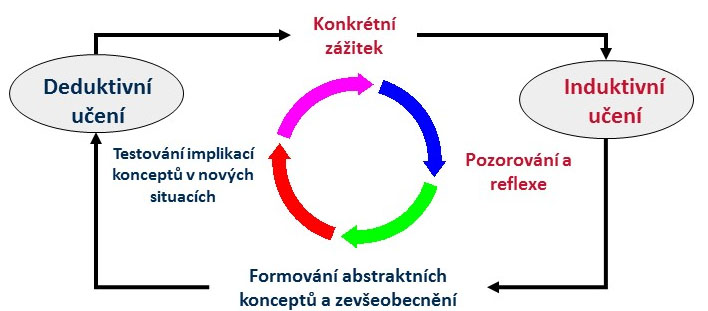Experiential learning

First experience, then knowledge. This is the basic principle of experiential learning. Kolb and Fry, on the basis of practice formulated their famous model of the four elements of learning:
• specific experience;
• observation and reflection;
• intellectual understanding (the making of an abstract concept and/or, knowledge);
• testing in the new situation.
Later it became clear that is possible to begin at any one of these elements and it is a continuing, upward spiral of learning.

“A person cannot teach another person directly; a person can only facilitate another's learning” (Rogers, 1951).
Psychologist David Kolb is the person who probably most influenced modern education of managers. He further developed what some psychologists had already proposed, in particular Carl Rogers. Twenty-five years earlier Rogers had studied and published on the topic of learning, introducing the term ‘person-centred learning’. However, it was Kolb who was able to make experiential learning visible in the field of leadership and management. The basic scheme begins with inductive learning - namely learning with concrete experience. It may be represented by a supervisor who first shows an operator how to do the procedure (while constantly commenting on what the operator does), asks the operator to describe what they saw and how they understood it, and then the operator will try to do the operation themselves. This cycle can be repeated.
This process is described using the most practical and concrete level of production. It works in the same way when formulating a strategy, managing situational leadership or Level 5 leadership at a top management position. The difference is only, for the operator - for safety reasons, the supervisor has demonstrated how to do the procedure. For senior management, we can proceed with the creation of strategies in four steps:
- enter the task of formulating strategy (specific experience by its creation);
- reflect together and identify what concepts managers use intuitively;
- supply managers with possible approaches and concepts to create a strategy and discuss them;
- Finally, support the managers to review strategy and compare it with their original concept (testing the implications of new concepts + experience).
Kolb made a difference between ‘learning in the classroom’ and ‘solving problems’ (today we would call it project learning). When learning in the classroom, the teacher/lecturer manages the learning and the pupil/course participant is passive. By project learning many components are completely different:
- learner is in an active role;
- responsibility for the learning process is with the learner;
- ‘teacher’ is a facilitator;
- facilitator encourages learning by bringing problems;
- facilitator supports by facilitating the process of learning.
On some points, we differ from the original wording of Kolb. For example, the shift is that the facilitator ‘is not bringing problems', but participants work with the activities and problems they bring themselves. Nevertheless, Kolbe’s basic principle is still valid.


